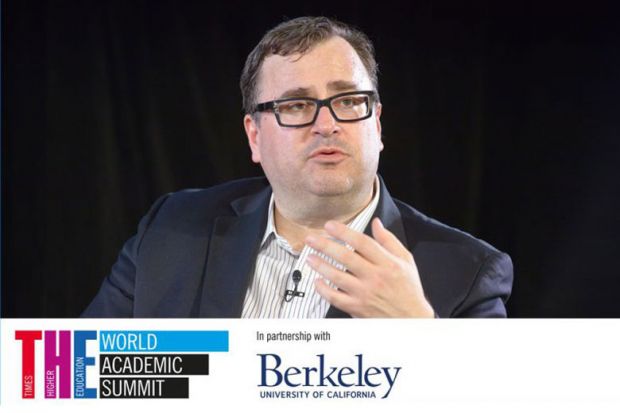Pre-register for the THE World Academic Summit 2017 at King's College London
The rise of the internet means that teaching students information that they can remember is "no longer critical" to the mission of universities, the co-founder of LinkedIn said.
Reid Hoffman told the Times Higher Education World Academic Summit, held at the University of California, Berkeley, that many of the facts that the graduates of the past would have needed to recall were now readily available via search engines.
The technology entrepreneur, who is now LinkedIn's executive chairman, said that higher education institutions should instead focus on teaching undergraduates how to discern truth among the mass of information available on the internet.
Talking in conversation with Nicholas Dirks, Berkeley's chancellor, Mr Hoffman said that graduates of the past would have had to rely heavily on information that they learned at university.
"That doesn't matter as much any more; what really matters is the ability to find it quickly on your mobile phone," he said. "Being able to resolve truth is what matters much more than 'oh I know I've read that book, I can't get to it right now'.
"That's still useful but it's no longer critical."
Mr Hoffman said that universities' other key role was to place students within networks that would allow them to develop skills and access opportunities over the course of their lives.
The "old industrial model" of learning skills at university and using them for the rest of your career was radically outdated, he argued.
“Classic pieces of advice like...‘study your passions’, [they are] radically insufficient now,” Mr Hoffman said. “Now it’s [about]...connecting into networks, are those networks the kinds of things that you will find rewarding, that will lead you on a career trajectory?”
During the discussion, Mr Hoffman outlined his hope that LinkedIn would be able to analyse the career and life outcomes of graduates with particular educational backgrounds, to help prospective students understand which learning path was best for them.
But this approach was criticised by Sir Leszek Borysiewicz, the vice-chancellor of the University of Cambridge, who said such a “predictive environment” might fail to identify and support the “outliers” who would have the ideas that were capable of fundamentally changing society.
Mr Hoffman agreed that the identification of outliers was an issue that could be solved only by a combination of machine and human expertise.
Register to continue
Why register?
- Registration is free and only takes a moment
- Once registered, you can read 3 articles a month
- Sign up for our newsletter
Subscribe
Or subscribe for unlimited access to:
- Unlimited access to news, views, insights & reviews
- Digital editions
- Digital access to THE’s university and college rankings analysis
Already registered or a current subscriber? Login








